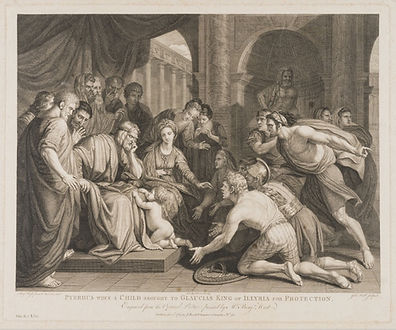Citizenship
“Perhaps nothing outside of the Bible has the educational value of Plutarch’s Lives.”
Charlotte Mason, School Education p.235
"I am writing biography, not history; and often a man's most brilliant actions prove nothing as to his true character, while some trifling incident, some casual remark or jest will throw more light upon what manner of man he was than the bloodiest battle, the greatest array of armies, or the most important siege. Therefore, just as portrait painters pay most attention to those peculiarities of the face and eyes, in which the likeness consists, and care but little for the rest of the figure, so it is my duty to dwell especially upon those actions which reveal the workings of my heroes' minds, and from these to construct the portraits of their respective lives, leaving their battles and their great deeds to be recorded by others." -Plutarch, Life of Alexander
From Citizenship to Character
Plutarch’s Lives–considered an essential component of a good education until recently–is a work that has greatly influenced our culture. The founding fathers of our nation studied Plutarch extensively to help them determine how to shape our government and Constitution. Shakespeare drew extensively from Plutarch in the writing of his historical plays. Knowing these versions of these historical characters will not only help our students understand, respect, and enjoy our own culture, but to develop a sense of why character matters. Our role is not for self, but to love and serve The Lord and others.
Students will meet these men at moments of greatness and misery. Experiencing how a person's character is shaped through the little moments of a life. How duty, honor, country and our ideals about each idea shape who we become in action, deed, and our overall character. Each of us are marked by strengths and flaws and gradually students will wrestle more and more with issues of character and conduct through the lives that live again.
Plutarch’s Lives are also artistically beautiful. There are various translations to choose from. We are going to focus on the classic translation by Sir Thomas North even though it is a translation from a translation it is a rich option.
Form I
-
Through stories of people in history character and a community mindset is developing. We will read various stories about people from Fifty Famous People.
Form II
-
In the first year of Form II, students begin to study the lives of famous Romans, using Mrs. Beesly’s Stories from the History of Rome. They will begin to contemplate what citizenship is, ask intentional questions about choices and why they matter. They will delve into what constitutes good character and begin to connect the dots between leadership and decision-making.
-
In their fifth grade year, they are ready to join in with the Life that the Form III-IV students are reading.
Forms III-IV
-
In Forms III and IV, students meet to read, narrate, and discuss the Plutarch Lives we will focus on. They will begin to discern motives and actions of various leaders while realizing that decisions are not quite as simple as we may have thought in the past. Students will begin to see how the needs of the whole are valued versus the needs of the individual. We encourage families to begin reading Ourselves by Charlotte Mason at home in 7th grade. This will greatly contribute to the conversation as self-knowledge and personal character contribute to the public good of the people.
Forms V-VI
-
In Forms V and VI students may move out of reading Plutarch Lives. This is when a more focused look of citizenship, government, and economics takes center stage through essays and classic works. Ourselves book 2 by Charlotte Mason is read beginning in form V (10th grade).
Works To Be Read
Year 1 Publicola and Pyrrhus
Year 2 Nicias and Crassus
Year 3 Aristides and Timoleon
Year 4 Alexander
Year 5 Solon and Julius Caesar
Year 6 Themistocles and Pericles
*during our season of rest feel free to read another life: ...
Shakespeare
“We probably read Shakespeare in the first place for his stories, afterwards for his characters. . . . To become intimate with Shakespeare in this way is a great enrichment of mind and instruction of conscience. Then, by degrees, as we go on reading this world-teacher, lines of insight and beauty take possession of us, and unconsciously mould our judgments of men and things and of the great issues of life.”
-Charlotte Mason
Satisfying Stories to Glorious English
Shakespeare’s stories are complex and interesting! Students of all ages enjoy the turns and twists of the plots, the fascinating characters, and the humor or pathos of these plays. As they grow older, we grapple with the original language, and naturally move into discussion of the moral issues addressed and the beauties of the literary form. Each year, students present a “Shakespeare Showcase,” acting out the scenes that they have been immersed in together for months.
Form I
At the Form I level, students gain a familiarity with the plot and characters of a Shakespeare play, reading and narrating an adapted version.
Form II-VI
In Form II-VI, students read the original version of our play. They read it aloud in parts, pausing regularly to narrate and discuss. Discussions explore the “lines of insight and beauty” and “great issues of life” that students have seen.
Works To Be Read
Year 1 "Comedy of Errors" and “Macbeth”
Year 2 "The Tempest" and “Midsummer's Night Dream”
Year 3 "Julius Caesar" and “As You Like It"
Year 4 "Romeo and Juliet" and "Much Ado About Nothing"
Year 5 "Hamlet"
Year 6 "Taming of the Shrew" and "Twelfth Night"
Year 7 "King Lear"
*Begin the cycle over
Shakespeare and Plutarch Extras
Comedy of Errors & Macbeth
Free Dramatized Audio and Full Text:
https://shakespearenetwork.net/works/play/comedyerrors
https://shakespearenetwork.net/works/playmenu/macbeth
Course Hero Study Guides:
https://www.coursehero.com/lit/The-Comedy-of-Errors/
Pyrrhus
